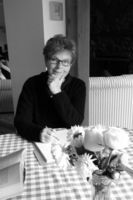GG Winning Poet Arleen Paré's New Collection Examines the Impact and Legacy of Early Friendships
Arleen Paré's First (Brick Books) appropriately takes us back to the beginning: both the beginning of identity and connection in the search for a friend from long ago (the first one she ever made), and the literal first: the birth of the cosmos.
Part mystery, filled with yearning and fractured memories, and part cerebral experiment, First is a deeply honest collection that asks the quintessential question: who are we, and how did we first start to become that person? In focusing on the power of early friendship to shape our identities, she delves, wisely and richly, into an often overlooked aspect of the emotional life. Rarely do friends and their impact get the same thoughtful, complex examination that literature usually reserves for family and lovers.
First is the seventh collection from Paré, a Governor General’s Award–winning poet, and it is a moving examination of childhood, memory, desire, and identity from a poet whose mastery of language and poetics is inspiring to witness. We're excited to welcome Arleen to Open Book today as part of our Poets in Profile series, to speak about First and her life in poetry.
She tells us about embarking on her poetry journey after earning a Masters degree in her forties, the recent read she loved so much that it inspired her next project, and the very best thing about being a poet.
Open Book:
Can you describe an experience that you believe contributed to your becoming a poet?
Arleen Paré:
When I finished writing and defending my M.A. thesis, which I had enjoyed writing, I wanted to keep writing. I started to write a novel; very fanciful, I realize as I look back. I joined a writing group of four friends, and when we met at the first meeting, we had all written poems. I wrote a poem because it was shorter than writing prose (my novel). I was still working full time and time was limited. We all agreed that we had written credible poetry and so I carried on. I was forty-nine.
OB:
What is the first poem you remember being affected by?
AP:
I vividly recall Matthew Arnold’s “Dover Beach” in grade eleven, the haunt of it, the sea, the longing, the language, the sadness: Listen! you hear the grating roar/ Of pebbles which the waves draw back, and fling. The first poem that moved my adolescent soul. Sister Frances Dennis was the English teacher at the time, and it may have been her presentation and teaching of “Dover Beach” that affected me more than the poem itself, but I think it was the poem. It is still a favourite of mine: But now I only hear/ Its melancholy, long, withdrawing roar... the haunt remains.
OB:
Do you write poems individually and begin assembling collections from stand-alone pieces, or do you write with a view to putting together a collection from the beginning?
AP:
I have mainly written with a theme in mind. I have written at least one collection, He Leaves His Face in the Funeral Car, which is an assemblage of individual poems, but I find having a theme prompts me to write with more energy. I enjoy the research of the topic and the focus that this way of writing promotes.
Your CanLit News
Subscribe to Open Book’s newsletter to get local book events, literary content, writing tips, and more in your inbox
OB:
What was the last book of poetry you read that really knocked your socks off?
AP:
I have just read a wonderful collection by Etel Adnan called Time. It not only knocked my socks off, I have fallen in love with it and am writing a collection inspired by Etel Adnan and her poems in this book. That’s the kind of art I love: the kind that makes you want to write, or if you are a painter, makes you want to paint. That kind of inspiration! Socks on or socks off.
OB:
What is the best thing about being a poet... and what is the worst?
AP:
The best is the writing and for me the best writing right now is poetry. No doubt, this is the best of being involved in any art: the doing of it, the making of the art!! The worst is the business end of art. In the world of poetry, it’s primarily, the business of finding the right publisher, but the right publisher can make the business end much more enjoyable. Fortunately for me, I have found some very fine, professional, and personable people in the field of publishing. So – I have the best in making the art and I have had the best in the marketing of my art – so lucky an I!!!
_______________________________________
Arleen Paré’s first book, Paper Trail, was nominated for the Dorothy Livesay BC Book Award for Poetry and won the City of Victoria Butler Book Prize in 2008. Leaving Now, a mixed-genre novel released in 2012, was highlighted on All Lit Up. Lake of Two Mountains, her third book, won the 2014 Governor General’s Award for Poetry, was nominated for the Butler Book Prize and won the CBC Bookie Award. Paré’s poetry collection, He Leaves His Face in the Funeral Car, was a 2015 Victoria Butler Book Prize finalist. The Girls with Stone Faces, her fifth book, won the American Golden Crown Award for poetry in 2018. Her sixth book, Earle Street, was released in Spring, 2020. She lives in Victoria with her partner of forty years.





